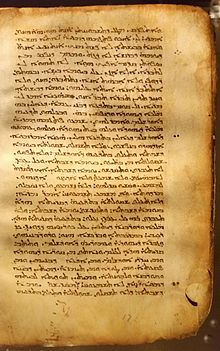
Back بشيطتا Arabic ܡܦܩܬܐ ܦܫܝܛܬܐ ARC بشيطتا ARZ Пешыта Byelorussian Пэшыта BE-X-OLD Пешита Bulgarian Peixitta Catalan Pešita Czech Peschitta German Πεσίτα Greek
| Peshitta | |
|---|---|
 9th-century manuscript | |
| Full name | ܡܦܩܬܐ ܦܫܝܛܬܐ mappaqtâ pšîṭtâ |
| Other names | Peshitta, Peshittâ, Pshitta, Pšittâ, Pshitto, Fshitto |
| OT published | 2nd century |
| NT published | 3rd-5th century [1] |
| Translation type | Syriac language |
| Religious affiliation | Syriac Christianity |
ܒܪܵܫܝܼܬܼ ܒ̣ܪܵܐ ܐܲܠܵܗܵܐ ܝܵܬ݂ ܫܡܲܝܵܐ ܘܝܵܬ݂ ܐܲܪܥܵܐ ܘܐܲܪܥܵܐ ܗ̣ܘܵܬ݂ ܬܘܿܗ ܘܒ݂ܘܿܗ ܘܚܸܫܘܿܟ݂ܵܐ ܥܲܠ ܐܲܦܲܝ̈ ܬܗܘܿܡܵܐ ܘܪܘܼܚܹܗ ܕܐܲܠܵܗܵܐ ܡܪܲܚܦܵܐ ܥܲܠ ܐܲܦܲܝ̈ ܡܲܝ̈ܵܐ ܘܐܸܡ̣ܲܪ݂ ܐܲܠܵܗܵܐ: ܢܸܗ̣ܘܸܐ ܢܘܼܗܪܵܐ ܘܲܗ̣ܘܵܐ ܢܘܼܗܪܵܐ
ܗܵܟ݂ܲܢܵܐ ܓܹܝܪ ܐܲܚܸܒ݂ ܐܲܠܵܗܵܐ ܠܥܵܠܡܵܐ ܐܲܝܟܲܢܵܐ ܕܠܲܒ݂ܪܸܗ ܝܼܚܝܼܕ݂ܵܝܵܐ ܢܸܬܸܠ ܕܟ݂ܿܠ ܡ̇ܲܢ ܕܲܡܗܲܝܡܸܢ ܒܸܗ ܠܵܐ ܢܹܐܒ݂ܲܕ݂ ܐܸܠܵܐ ܢܸܗܘܘܼܢ ܠܸܗ ܚܲܝܹ̈ܐ ܕܲܠܥܵܠܲܡ | |
| Part of a series on |
| Oriental Orthodoxy |
|---|
 |
| Oriental Orthodox churches |
|
|
| Part of a series on the |
| Bible |
|---|
 |
|
Outline of Bible-related topics |
The Peshitta (Classical Syriac: ܦܫܺܝܛܬܳܐ or ܦܫܝܼܛܬܵܐ pšīṭta) is the standard version of the Bible for churches in the Syriac tradition, including the Maronite Church,[2] the Chaldean Catholic Church,[3] the Syriac Catholic Church,[4] the Syriac Orthodox Church, the Malankara Orthodox Syrian Church, the Malabar Independent Syrian Church (Thozhiyoor Church), the Syro-Malankara Catholic Church, the Assyrian Church of the East and the Syro-Malabar Church.
The consensus within biblical scholarship, although not universal, is that the Old Testament of the Peshitta was translated into Syriac from Biblical Hebrew, probably in the 2nd century CE, and that the New Testament of the Peshitta was translated from Koine Greek, probably in the early 5th century.[5][6] This New Testament, originally excluding certain disputed books (2 Peter, 2 John, 3 John, Jude, Revelation), had become a standard by the early 5th century. The five excluded books were added in the Harklean Version (616 CE) of Thomas of Harqel.[7][8][9] The New Testament of the Peshitta often reflects the Byzantine text-type, although with some variations.[10][11]
- ^ "Peshitta | Definition, History, & Facts | Britannica". www.britannica.com. Retrieved 2024-02-23.
- ^ Assemani, Maronite Light from the East for the Church and the World
- ^ Introduction To Bibliology: What Every Christian Should Know About the Origins, Composition, Inspiration, Interpretation, Canonicity, and Transmission of the Bible
- ^ Studia Humana Volume 2:3 (2013), pp. 53—55
- ^ Sebastian P. Brock The Bible in the Syriac Tradition St. Ephrem Ecumenical Research Institute, 1988. Quote Page 13: "The Peshitta Old Testament was translated directly from the original Hebrew text, and the Peshitta New Testament directly from the original Greek"
- ^ Metzger, Bruce M. (1977). The Early Versions of the New Testament: Their Origin, Transmission and Limitations. Oxford University Press. p. 57–58.
The hypothesis that the Peshitta version of the New Testament was made by or for Rabbula, bishop of Edessa, probably in the early years of his episcopate, which extended from A.D. 411 to 435 (...) The hypothesis of the Rabbulan authorship of the Peshitta New Testament soon came to be adopted by almost all scholars, being persuaded perhaps more by the confidence with which Burkitt propounded it than by any proof other than circumstantial evidence.
- ^ Bromiley, Geoffrey W. (1995). The International Standard Bible Encyclopedia: Q-Z. Wm. B. Eerdmans. p. 976. ISBN 0-8028-3784-0.
Printed editions of the Peshitta frequently contain these books in order to fill the gaps. D. Harklean Version. The Harklean version is connected with the labors of Thomas of Harqel. When thousands were fleeing Khosrou's invading armies, ...
- ^ Kiraz, George Anton (2002) [1996]. Comparative Edition of the Syriac Gospels: Aligning the Old Syriac Sinaiticus, Curetonianus, Peshitta and Harklean Versions (2nd ed.). Piscataway, New Jersey: Gorgias Press.
- ^ Kiraz, George Anton (2004) [1996]. Comparative Edition of the Syriac Gospels: Aligning the Old Syriac Sinaiticus, Curetonianus, Peshitta and Harklean Versions (3rd ed.). Piscataway, New Jersey: Gorgias Press.
- ^ Metzger, Bruce Manning (1977). The Early Versions of the New Testament: Their Origin, Transmission and Limitations. New York; Oxford: Clarendon Press. p. 61. ISBN 0-19-826170-5.
- ^ Pickering, Wilbur N. (2012-04-16). Identity of the New Testament Text III. Wipf and Stock Publishers. ISBN 978-1-62032-097-6.
© MMXXIII Rich X Search. We shall prevail. All rights reserved. Rich X Search